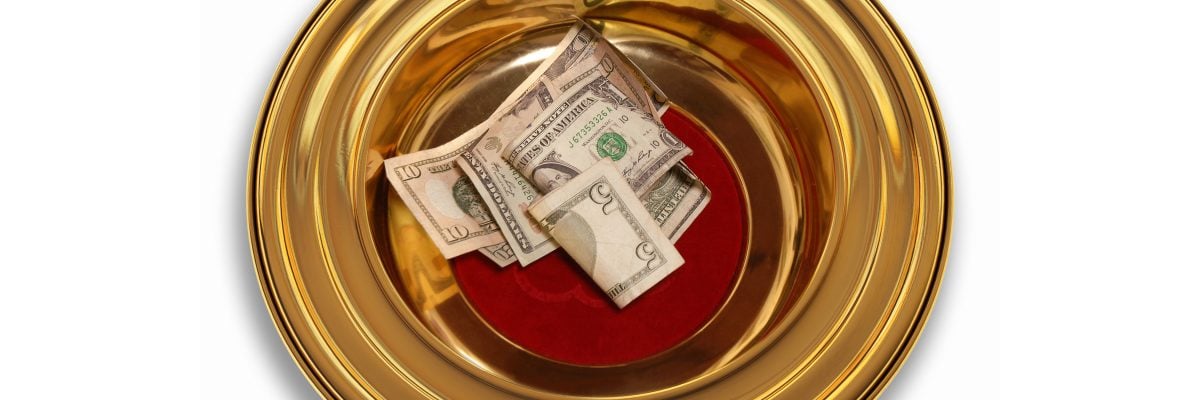
A slight detour on a cross-country trip took me to Possum Kingdom. The tiny community is in north-central Texas and lies nestled against the shore of a lake that attracts many people during the summer but few on the chilly day that I visited. I dropped in to see Bill and Mary Keeley, long-time friends of the family. When I was a teenager, they lived across the street from us, and I am godfather to two of their now-grown children.
Bill had sent me an e-mail a few weeks earlier, seeking my ideas on the proper way for a diocese to arrange for its cathedraticum. The Catholic Encyclopedia defines cathedraticum (known nowadays in many dioceses as the stewardship fund) as “a certain sum of money to be contributed annually for the support of the bishop, as a mark of honor and in sign of subjection to the cathedral church, hence its name.” The money is paid by the parishes within the diocese and goes to support the bishop personally and to underwrite diocesan-wide expenditures. The practice goes back centuries.
Covering diocesan needs
Traditionally, the cathedraticum was a fixed-amount tax, each parish paying the same, regardless of income or membership. Since the second Plenary Council of Baltimore, held in 1866, in this country the cathedraticum also has come to refer to a tax proportionate to the income of the parish. We thus find both fixed-amount and proportionate-amount systems.
Long ago the cathedraticum was a moderate tax, often hardly more than a token, but in modern times it has come to be relied on, in many places, to cover the basic needs of the diocese, and in the process it has become something other than moderate.
In Bill’s diocese the cathedraticum is a fixed-amount tax. That’s a boon for large and growing parishes in the cities—the equivalent per capita tax is small—but a handicap for parishes such as the one in Possum Kingdom, which has so few members that it warrants only a Saturday-evening Mass and is served by a priest who drives out from Mineral Wells.
I cannot say I was of much help to Bill, but I could sympathize with his concern. Consider the situation in San Diego’s Immaculate Conception parish. Although in the heart of San Diego, it is located in a state historic park called Old Town. Government tabulators say Old Town is the most visited historic park in California. I can believe it. On any given Sunday about three-quarters of the Mass-goers at Immaculate Conception are visitors. It works out that half of the parish income comes from out-of-towners. The parish is taxed on its total income, the diocese using the proportionate-amount system.
In one sense the tax seems fair, in another unfair. Half of the parish income seems “free,” coming from visitors, so it seems there should be no complaint about having that half taxed. On the other hand, if one argues that each Catholic in the diocese should contribute the same to diocesan-wide expenditures (seminary, diocesan-sponsored charitable works, and so on), then this parish’s members are paying at twice the rate of those in other parishes.
Raising necessary funds
I see both sides of the argument and cannot say that either side has an open-and-shut case. Bill’s situation is different. If his little parish puts in the kitty the same amount the richest and most populous parish puts in, something seems askew. Although the parish amount is fixed, the per capita amount is not. The folks in Possum Kingdom are responsible, individually, for much more than are parishioners at St. Big Bucks.
Canon law has something to say about taxes on parishes. Canon 1263 says a bishop “has the right to impose a moderate tax . . . which should be proportionate to [the] income” of the parish and which may be applied to “diocesan needs.” Note that this tax “should be proportionate” but, apparently, need not be. Thus fixed-amount taxes seem to be permissible.
Canon 1266 refers to a different way to raise money. It says the bishop “may prescribe the taking up of a special collection for specific parochial, diocesan, national, or universal projects.” This collection is not a tax as such, and one may presume that the amount collected mirrors the income of the parishes.
One thing all Catholics, I think, can agree on is that dioceses need to raise funds to pay for diocesan-wide activities. The disagreement concerns methodology. I have no solution to the dilemma but do have a suggestion that might ameliorate the situation.
Catholics donate to their parishes at about half the rate Protestants do—one percent of family income versus two percent. I used to be an usher at a parish I no longer attend, and, frankly, I felt embarrassed for well-dressed and apparently well-off people who searched through a thick wad of bills to drop into the basket a single image of George Washington. It wasn’t so much that they were miserly but that they never were instructed on the duty of supporting the Church according to one’s means.
How about a one percent increase?
I’m not advocating that we give a hard sell on tithing ten percent, but I wouldn’t mind homilies urging us to try to match our Protestant brethren’s two percent. I realize that priests cringe at having to ask for money. They shouldn’t have to ask. Their congregants should be sufficiently generous that the parishes should have a bit of a surplus, but most parishes seem to be in perpetual financial straits, in large part because priests don’t ask their flocks to do what they ought to do in terms of parish support.
I know Catholics who earmark ten percent of their income for the Church. They aren’t wealthy people who easily can spare the cash. It’s just that they make the Church a priority. Unfortunately, they represent a small minority among Catholics.
I sometimes wonder what great things parishes could accomplish in terms of apologetics and evangelization if only they had the wherewithal. They often enough have the requisite knowledge and skills among the people in the pews, but they don’t have the financial means to carry out the sorts of projects that, ideally, every parish would undertake as a matter of course.
Beyond that, if Catholic giving just rose to the level of Protestant giving, many parishes could afford to start (or keep) a Catholic school. We sorely need more, not fewer, Catholic schools, but we’re not likely to see new ones pop up unless Catholics learn to take seriously their obligation to support the Church with more than just good wishes.



